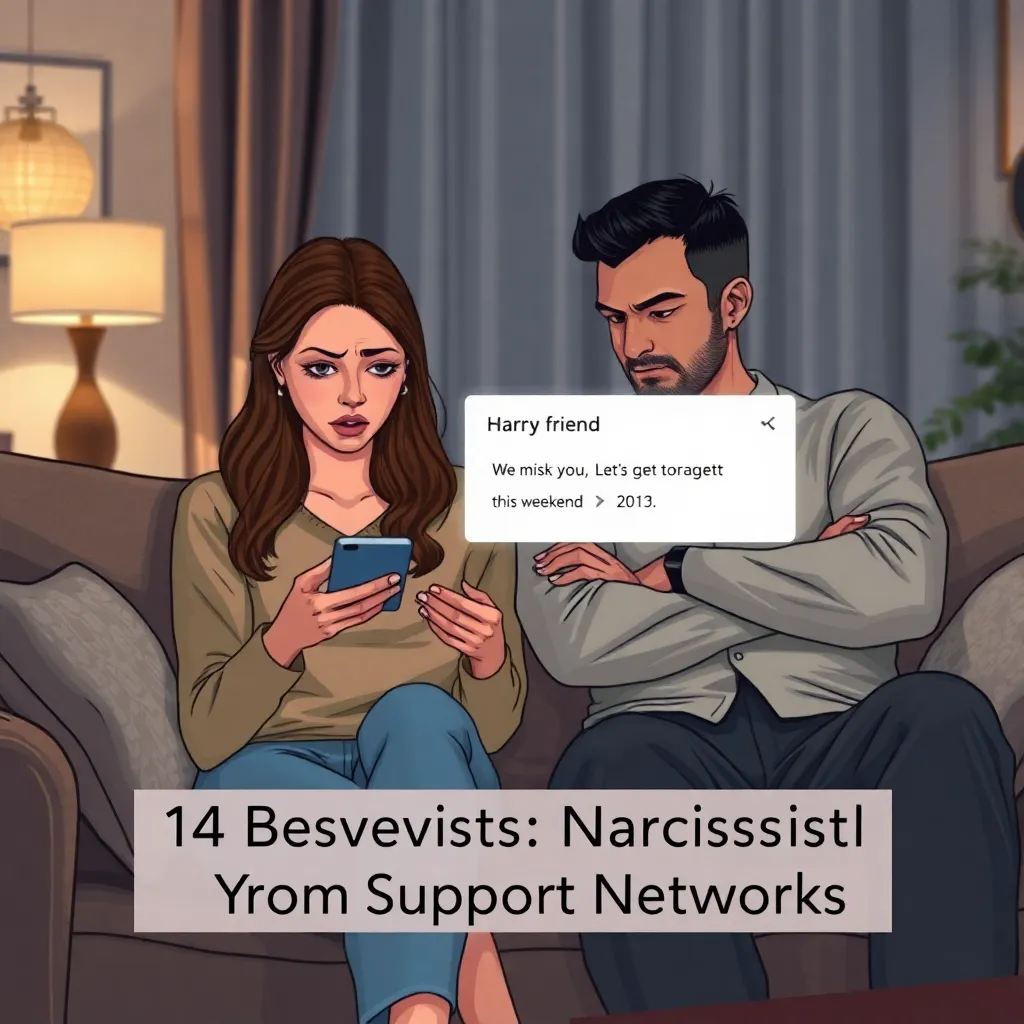Navigating the complexities of a relationship with a narcissist can feel like walking through a maze without a map. If you’ve ever found yourself questioning your reality or doubting your perceptions, you’re not alone, and understanding the dynamics of gaslighting can be a vital step toward reclaiming your sense of self. In relationships where one partner exhibits narcissistic traits, gaslighting becomes an insidious tool that distorts reality, leaving the other partner feeling confused and unsupported. It’s crucial to recognize these behaviors, not only to protect your emotional well-being but also to foster healthier, more authentic connections.
This article aims to shed light on 14 specific behaviors that narcissists often use to gaslight their partners. By exploring these behaviors, you will gain insight into how gaslighting operates and learn strategies to counteract its effects. Recognizing these patterns is the first step toward empowerment, allowing you to establish boundaries and nurture your own emotional health. With this knowledge, you can start to rebuild your confidence and trust in your perceptions, paving the way for more balanced and respectful relationships.
Understanding these dynamics can be both eye-opening and liberating, providing you with the tools needed to navigate your relationship with clarity and strength. As you read on, remember that seeking help and support from trusted friends, family, or professionals can further bolster your journey toward healing. This article is designed to be a resource and companion as you work through the complexities of a relationship affected by narcissistic behaviors. Together, we’ll explore these behaviors and arm you with the information necessary to protect your well-being and find peace.
1. Manipulating Your Perception of Reality

In relationships with a narcissist, you might find yourself constantly second-guessing your own reality. They often engage in behaviors that subtly manipulate your perception, leaving you feeling disoriented and unsure of your own experiences. Imagine being told that your memory of a particular event is entirely wrong, even when you vividly recall it happening. This is a classic tactic used by narcissists to create a sense of doubt and confusion.
Consider a scenario where your partner insists that you agreed to something you clearly remember opposing. Over time, these instances accumulate, making you question your own judgment and reality. Experts suggest that recognizing these patterns is the first step towards reclaiming your sense of self. By understanding that this manipulation is a tactic rather than a reflection of your reality, you can begin to navigate the relationship more effectively.
One powerful way to counter this manipulation is to keep a journal of events and feelings as they occur. Documenting your experiences allows you to have a tangible record, which can be invaluable when you start to doubt yourself. This practice not only reinforces your own perception of reality but also serves as a tool to break the cycle of manipulation. Remember, empowering yourself with knowledge and evidence is key to maintaining your personal truth.
Ultimately, reclaiming your reality involves setting firm boundaries and seeking external support. Surround yourself with individuals who validate and affirm your experiences to reinforce your sense of self. By taking these steps, you’ll be better equipped to recognize manipulative behaviors and maintain a healthy relationship dynamic.
2. Twisting Conversations to Deflect Blame

In relationships with a narcissist, conversations often feel like a maze with no exit. They may *twist conversations* to skillfully *deflect blame*, leaving you questioning your own actions and words. Picture a scenario where you express concern about their behavior, only for them to turn the tables and accuse you of being overly sensitive or unreasonable. This tactic can make you feel guilty for merely voicing your feelings, effectively shifting the focus away from their behavior.
Such interactions can be emotionally draining and confusing, as they *redefine reality* to suit their narrative. For instance, during a disagreement, they might recall events and conversations differently, insisting on a version that portrays them as the victim. This behavior is a calculated move to avoid accountability and maintain control over the relationship dynamics. Recognizing this pattern is the first step toward reclaiming your emotional well-being.
Experts suggest that maintaining your own *sense of reality* is crucial when dealing with a narcissist’s manipulative tactics. Documenting conversations can be a practical way to remind yourself of what truly transpired. By keeping a journal or notes on key discussions, you can refer back to them when faced with distorted memories or accusations. This empowers you to stand firm in your truth and resist the pressure to accept their skewed version of events.
Ultimately, understanding these dynamics allows you to protect your emotional health and establish firmer boundaries. Knowing that you are not alone in experiencing these tactics can be incredibly validating and empowering. By learning to identify and counter these behaviors, you take a significant step toward a healthier relationship dynamic. This awareness equips you to navigate interactions with greater clarity and confidence, prioritizing your emotional well-being.
3. Undermining Your Self-Esteem

When a narcissist begins to undermine your self-esteem, they often start by making subtle comments that chip away at your confidence. These remarks might seem insignificant at first, but over time, they accumulate and can make you doubt your own worth.
Imagine you’re excited about a personal achievement, only to have it dismissed or belittled by your partner. This consistent behavior can create a cycle of self-doubt, making you question your abilities and value in the relationship.
Experts suggest that narcissists use these tactics to maintain control and power. By eroding your self-esteem, they ensure that you remain dependent on their approval and validation, giving them an upper hand in the relationship.
Rebuilding your self-esteem involves recognizing these harmful patterns and setting boundaries. By asserting your worth and seeking support, you can begin to regain confidence and establish a healthier dynamic in your relationships.
4. Dismissing Your Feelings as Overreactions

Narcissists often dismiss their partner’s feelings by labeling them as mere overreactions. This tactic can leave you feeling invalidated and questioning the legitimacy of your emotions. Imagine sharing with your partner that you felt hurt by something they said, only to hear, “You’re just being too sensitive.” Over time, such dismissals can erode your confidence in your own emotional experiences.
In many relationships, partners might find that their genuine concerns are brushed off without a second thought. This can make it difficult to trust your own perceptions and feelings. To counter this, it’s crucial to remind yourself that your feelings are valid and deserve to be acknowledged. Seeking support from friends or a therapist can offer a more objective perspective and reinforce your emotional reality.
While it may seem challenging, standing firm in your emotions is essential. You might say, “I understand you don’t see it this way, but this is my experience, and I need you to hear it.” By setting boundaries and clearly communicating your needs, you can create a healthier dialogue. This approach not only validates your feelings but also encourages mutual respect within the relationship.
Experiencing such dismissals can be frustrating, but acknowledging this pattern is a powerful first step. Understanding that your partner’s dismissal is a manipulation tactic can empower you to detach from their attempts to undermine you. By reinforcing your emotional boundaries, you not only protect your mental well-being but also foster a space for more authentic connections.
5. Invalidating Your Personal Experiences

When a person frequently feels like their personal experiences are being invalidated, it can lead to a profound sense of confusion and self-doubt. Narcissists often achieve this by subtly twisting facts or outright denying events, making their partner question the reality of their own experiences.
Imagine sharing a cherished memory, only to be told that it didn’t happen the way you remember. This tactic not only undermines your trust in your own perceptions but also reinforces the narcissist’s control over the narrative in the relationship.
Real-world scenarios often reveal how partners might dismiss each other’s personal achievements or significant moments as unimportant or exaggerated. Over time, this minimizes the value of your experiences, making you more reliant on their version of reality.
One effective strategy is to keep a personal journal to record your experiences and feelings. This practice helps affirm your reality and provides a tangible record that can counteract the gaslighting attempts.
Embracing your own truth and validating your experiences is a powerful step towards reclaiming your confidence. Always remember that your experiences are real and deserve to be acknowledged and respected.
6. Projecting Their Faults onto You

In relationships with narcissists, you might find yourself suddenly blamed for things you haven’t done. This is because narcissists often engage in projecting their faults onto you, making it appear as if their shortcomings are actually yours. For example, if they struggle with jealousy, they may accuse you of being overly suspicious without any real cause. This projection can leave you feeling confused and doubting your own perceptions.
Imagine a scenario where your partner accuses you of being unfaithful, despite their own history of infidelity. In such cases, the narcissist projects their own guilt onto you, making it difficult for you to see the real root of the problem. According to relationship experts, this behavior is a defense mechanism to avoid facing their own flaws. Recognizing this pattern can help you maintain your sense of self and reality.
To counteract this tactic, it’s crucial to develop a strong sense of self-awareness. By regularly reflecting on your own behaviors and values, you can build a shield against these manipulative projections.
Engaging in open conversations with trusted friends or a therapist can also validate your experiences.
Ultimately, the key to handling projection is to stay grounded in your own truth. Remember that their accusations may not reflect your reality but rather their internal struggles. By fostering a supportive network and maintaining clarity about your own identity, you can navigate these manipulative behaviors more effectively. When you understand this dynamic, you empower yourself to respond with confidence and resilience.
7. Creating Confusion and Self-Doubt

Narcissists often thrive on creating an aura of confusion and self-doubt in their relationships. They might say one thing and do another, leaving you questioning your reality and unsure of your perceptions. Imagine a scenario where your partner dismisses your feelings about a canceled plan, insisting they never agreed to it. This creates a loop of self-doubt, as you start to wonder if you’re remembering things incorrectly.
In these situations, it’s crucial to trust your own perceptions and memories. Keeping a journal of events can help you stay grounded and provide a reference point when your reality is being challenged. Sometimes, validating your experiences with a trusted friend or therapist can also be immensely helpful. This external perspective can help you regain your footing when you feel disoriented.
A narcissist may frequently change their story, further deepening your confusion. One day they might express love and appreciation, and the next, they might criticize you harshly. This inconsistency is designed to keep you off balance and dependent on their approval. Recognizing this pattern is the first step toward reclaiming your confidence and autonomy.
Ultimately, the goal is to cultivate a strong sense of self that is not easily swayed by external manipulation. By building up your self-awareness and trusting your instincts, you can navigate through the fog of confusion with greater ease. This will empower you to make decisions that align with your true self, rather than succumbing to the distorted reality presented by a narcissist. Remember, your perceptions and feelings are valid, and they deserve to be honored and respected.
8. Shifting Accountability in Arguments

In the midst of an argument, a narcissist often employs the tactic of shifting accountability to avoid taking responsibility for their actions. Instead of acknowledging their mistakes, they might turn the tables, leaving you feeling like the one at fault. This behavior can leave you questioning your own actions and intentions, fostering a lingering sense of confusion and self-doubt.
Consider a scenario where you express hurt feelings over something your partner said. Rather than acknowledging your emotions, a narcissist might respond with, “Well, if you hadn’t done XYZ, I wouldn’t have reacted that way.” This deflection not only dismisses your feelings but also places the blame squarely on your shoulders, making it difficult to find a resolution.
Experts suggest that this pattern of behavior is a common form of emotional manipulation. By constantly shifting blame, the narcissist maintains their sense of superiority and control in the relationship. This tactic erodes the foundation of trust and mutual respect, making it essential to recognize and address these behaviors early on.
Ultimately, understanding the dynamics of blame-shifting allows you to better navigate these challenging interactions. By honing your emotional intelligence and communication skills, you can begin to set boundaries and protect yourself from further manipulation. Remember, a healthy relationship thrives on accountability, empathy, and open dialogue, not blame and deflection.
9. Minimizing Their Hurtful Actions

In the intricate dance of relationships, a narcissist often employs the tactic of minimizing their hurtful actions. This behavior manifests in ways where they may downplay their negative actions, making their partner doubt the severity of the incident. Imagine a scenario where a partner repeatedly makes derogatory comments, only to later brush them off as jokes. Such dismissals leave the other person feeling both invalidated and confused about their own reactions.
By consistently diminishing the impact of their actions, narcissists maintain control and avoid taking responsibility. This can manifest in phrases like “You’re overreacting” or “It’s not a big deal,” which subtly shift the blame back to the partner. In these moments, the victim may feel compelled to question their own emotions, thereby undermining their self-worth and perceptions.
An important step in counteracting this strategy is recognizing the pattern and validating your own feelings. When faced with this kind of gaslighting, it’s crucial to remind yourself that your emotions are valid and deserving of acknowledgment. Engaging in open dialogues with trusted friends or a therapist can provide the external validation necessary to reinforce your own reality.
Moreover, setting clear boundaries is vital in preventing further emotional harm. Assertively communicating what behaviors are unacceptable helps to establish a healthier dynamic. It’s equally important to document instances of this behavior, as having a record can clarify patterns and bolster your confidence in assessing the situation.
Ultimately, understanding and identifying these patterns empowers you to take proactive steps towards a healthier relationship. While it may be challenging, choosing to prioritize your emotional well-being is a powerful move towards self-empowerment. Remember, your feelings are important, and acknowledging them is a crucial step in reclaiming your narrative.
10. Controlling Through Emotional Exploitation

Narcissists often exert control by exploiting emotions, using your emotional responses as a tool to manipulate situations. They may turn your genuine feelings against you, making you feel guilty or overly sensitive when you express emotional pain.
In relationships, this manipulation can look like dismissing your concerns as overreactions or pretending as if they are the victim. When confronted, they might say things like, “You’re too emotional,” or “I never said that,” which can leave you doubting your own perceptions.
To navigate this, it’s crucial to maintain a strong sense of self-awareness and establish what you know to be true about your feelings. Keep a journal or talk to a trusted friend who can help you reaffirm your emotional experiences.
Another effective strategy is to set firm boundaries and communicate them clearly to your partner. By doing so, you reclaim your power and affirm that your emotions matter, helping to protect yourself from emotional exploitation.
Ultimately, recognizing and addressing emotional exploitation is a step toward healthier and more balanced relationships. By valuing your own emotional well-being, you create a foundation for a supportive and genuine connection.
11. Playing the Victim to Gain Sympathy

One of the most insidious behaviors narcissists use to manipulate is playing the victim to gain sympathy. In relationships, this often manifests when they twist situations to make themselves appear as the wronged party, even when they are at fault.
Imagine a scenario where a partner consistently arrives late to events, causing frustration. Instead of acknowledging their lateness, a narcissist might claim they are being unfairly criticized, positioning themselves as the victim of harsh judgment.
This tactic is not only confusing but also emotionally draining for their partner, who might feel guilty for expressing legitimate concerns. When confronted with such behavior, it’s essential to maintain your perspective and recognize when your feelings are being invalidated by false victimhood.
Experts suggest that when dealing with such behavior, one should focus on the facts and avoid getting drawn into emotional arguments. By staying calm and reiterating the objective truth of the situation, you can resist the pull of their manipulative tactics.
By understanding this tactic, you can better navigate the emotional minefield it creates and protect your own emotional well-being. Remember, a healthy relationship should be based on mutual empathy and accountability, not manipulation and guilt.
12. Rewriting History to Suit Narratives

Narcissists often engage in the practice of rewriting history to align events with their preferred narrative. For instance, after a disagreement, they might later claim you agreed with them from the start, creating confusion and self-doubt.
This tactic is used to undermine your perception of reality, making you question your own memory and experiences. Imagine a scenario where you distinctly recall being supportive of a partner’s decision, only to have them later accuse you of being unsupportive throughout.
Over time, these repeated alterations can lead to a significant erosion of trust and self-confidence. When someone you care about persistently changes the past, it can feel like losing your grip on reality.
To counteract this behavior, it’s crucial to keep a record of important conversations and decisions, whether through journaling or other means. Trusted friends or a therapist can provide an outside perspective and support in reaffirming your experiences.
By reclaiming your narrative, you empower yourself and set healthy boundaries. Remember, your reality and experiences are valid and deserve to be honored.
13. Gaslighting Through Silent Treatment

In the complex world of relationships, the silent treatment is a subtle form of gaslighting that often leaves partners feeling confused and isolated. Imagine a scenario where you’re left wondering what you did wrong because your partner abruptly stops communicating, leaving you in a state of emotional limbo.
This manipulative tactic can create a sense of inadequacy, as the lack of communication makes it difficult to resolve conflicts. Such emotional withdrawal can be a tool that narcissists use to maintain control, leaving their partner desperate for validation and clarity.
In these instances, it’s crucial to recognize that the issue is not with you but with the unhealthy dynamic at play. Acknowledging the behavior as a form of manipulation can empower you to address it directly, fostering a healthier relationship environment.
Experts suggest setting clear boundaries and expressing how this behavior affects you emotionally. Communicating openly about how the silent treatment impacts your feelings can be crucial in preventing this cycle from perpetuating.
Remember, a relationship should be a partnership where both parties feel heard and respected. By understanding and addressing the silent treatment, you can reclaim your emotional well-being and encourage healthier interactions.
14. Isolating You from Support Networks

One of the most insidious ways a narcissist may attempt to control you is by isolating you from your support networks. They might subtly criticize your friends or family, suggesting they’re not good for you, or that they don’t really care about you. In a real-world scenario, you might notice your partner making excuses to avoid gatherings, or showing disdain when you express a desire to connect with loved ones. This behavior aims to make you doubt your support system, gradually leaving you feeling alone and dependent on the narcissist.
Over time, you may find yourself reluctant to reach out to friends or family, fearing disapproval or conflict. It’s common for individuals in this situation to second-guess their perceptions, wondering if their support network truly has their best interests at heart. Recognizing these patterns is crucial, as they are designed to erode your confidence in others and fortify the narcissist’s hold over you. An example might be a partner who constantly questions the intentions of your close friends, planting seeds of doubt that grow over time.
Experts suggest rebuilding these connections by setting healthy boundaries and communicating openly with your support network about your experiences. It’s important to remember that the people who genuinely care about you will listen and offer the support you need. Acknowledging the value of these relationships helps counteract the isolation tactics and strengthens your emotional resilience. Consider reaching out to a trusted friend or family member and sharing your concerns; their perspective can often provide clarity and comfort.
Ultimately, reclaiming your autonomy involves recognizing the importance of your support networks and actively nurturing them. While the journey may be challenging, re-establishing these bonds can be incredibly empowering. Remember, the goal is to create a balanced life where your relationships are based on mutual respect and genuine care, not control and manipulation. By valuing and engaging with your support network, you reinforce your foundation of strength and independence.
Conclusion: Creating Beautiful Outdoor Spaces
In navigating the intricate dynamics of relationships with narcissists, understanding the 14 gaslighting behaviors is crucial. From manipulation of reality and undermining self-worth to projecting blame and feigning ignorance, these behaviors can deeply affect emotional well-being. Recognizing these patterns allows you to reclaim your sense of self and autonomy. As an immediate step, consider journaling your experiences to gain clarity and validate your feelings. This reflective practice can serve as a powerful tool for emotional resilience.
Remember, awareness is the first step towards change. Bookmark this article as a valuable resource to revisit whenever you need a reminder of the signs to watch for and the empowerment strategies you can employ. By keeping these insights at your fingertips, you’re better equipped to foster healthier, more fulfilling relationships.
Looking ahead, embrace the journey towards relationship success with optimism and confidence. By educating yourself and taking proactive measures, you’re not only protecting your emotional health but also paving the way for more authentic connections. Empowerment starts with knowledge—hold onto it, nurture it, and watch your relationships transform.
